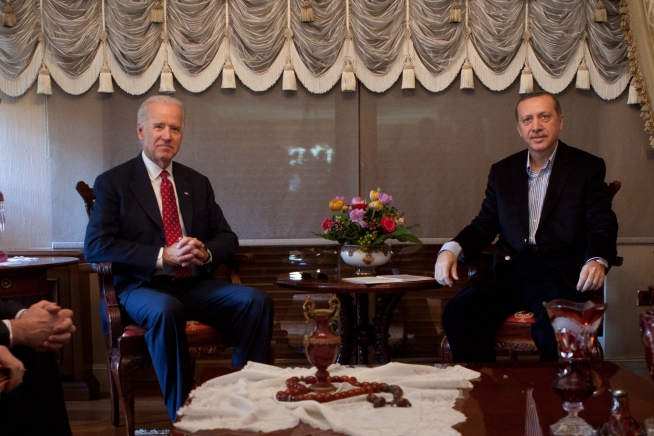 Official White House Photo by David Lienemann
Official White House Photo by David Lienemann
President Biden Should Press Erdogan on Turkey’s Nuclear Program
The June 14 meeting between Biden and Erdogan on the sidelines of a NATO summit presents Biden with an opportunity to bring up an issue not oft-discussed but which has the potential of becoming a serious threat in the future: Turkey’s nuclear program. With world powers focused on JCPOA negotiations, very little attention has been paid to Turkey’s nascent but growing nuclear industry.
Turkey is planning to commission its first nuclear power plant within the next couple of years, with the first reactor at Akkuyu scheduled to become operational in 2023, the centenary of the Turkish Republic. What Turkey will do afterwards is a mystery, and although Turkey claims its nuclear program is meant for peaceful purposes, it would be best to apply scrutiny preemptively, similar to the level of scrutiny Turkey has received for its purchase of the Russian-made S400 anti-air system.
At first glance, it appears that Turkey is merely exercising its right to develop nuclear energy for peaceful purposes and there is no further threat. Turkey is a signatory to all major nonproliferation treaties and historically a strong proponent of a Middle East Nuclear Weapon Free Zone. The potential threat is tied to the outcome of the current round of JCPOA negotiations.
Much of the calculus surrounding a Turkish decision to acquire nuclear weapons will hinge on what happens with the JCPOA. Turkey would no doubt perceive a nuclear Iran as a considerable threat, one great enough to push it towards the brink of crossing the nuclear threshold. Theoretically and in practice, the NATO nuclear umbrella should be enough to assuage Turkey’s security concerns. However, Turkey has neither control over the nuclear warheads nor the capabilities to deliver the payloads under a sharing agreement. In this regard, it is imperative to reach a deal with Iran that subsequently precludes a scenario where Turkey feels it needs to have nuclear weapons of its own.
Turkey’s internal politics are troubling as well. If what occurred at Incirlik during the coup attempt in 2016 was cause for concern, then Erdogan’s dismay at the disparity between the nuclear haves and the nuclear have-nots should have raised even louder alarms. On the centennial of the Turkish independence movement in 2019, Erdogan reportedly told his party members “several countries have missiles with nuclear warheads, not one or two. But [they tell us that] we can’t have them. This I cannot accept.” In fact, experts have already called for the removal and relocation of the US nuclear bombs housed in Turkey to other more strategic areas in Europe for security and operational reasons, but no such discussions appear to be taking place officially.
At the intersection of Europe and Asia, in control of an important maritime trade route, and in a region consumed by drug smuggling, refugee and migration flows, and terrorist groups and militias, Turkey is ideally positioned to play a significant and productive role in major regional and global issues. But Turkey’s recent record in the region is not one of a state devoted to upholding Western values like human rights, religious toleration, and democratic processes. This would make it a dangerous player on the global stage if it were to acquire nuclear weapons capabilities.
It is imperative that Biden shines a new focus on Turkey’s nuclear energy program and makes it clear that Turkey cannot count on the blind eye and tacit support given to it by the US and its other partners if it chooses to cross the nuclear threshold. Accordingly, Biden should push for assurances from Erdogan that Turkey’s nuclear energy program will not be used as a gateway towards developing nuclear weapons capabilities. Most importantly, Biden should convey to Erdogan that the US will no longer tolerate continued human rights violations and US guarantee of Turkish security is not tantamount to US support for Turkey’s increasing authoritarianism. In exchange, Biden should reaffirm US commitment to its nuclear umbrella and work with the P4+1 and Iran to ensure that the new JCPOA has a positive and productive result. Biden needs to make clear to Turkey the benefits of being a responsible player in NATO and in the international community, while outlining the consequences of running afoul of established norms.





